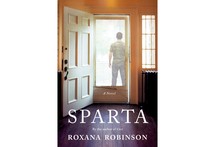Sparta
By Roxana Robinson
386 pages;
Sara Crichton
Some books you read because you're looking for that moment when you say, "Oh! Yes! That's me—only more articulately described." Other books you read looking for that moment when you say, "Oh! That is so, so, so not me. But now I understand a little more about the world." For most of us, Roxana Robinson's latest novel belongs in the latter camp. When college-educated 21-year-old Conrad Farrell leaves for the Iraq War, he is a classics major, obsessed with ancient Greek societies and his lustrous girlfriend Claire. When he returns, four years later, to his parents' ramshackle farmhouse in upstate New York, the framed photograph that he finds, of himself at his Marines graduation, is "the only link between the person who'd lived in this room and the person he'd become...There were two pasts, the past of his childhood and the past he'd just come from....They had no connection." Month after month, he struggles to re-enter American society, fighting off headaches, insomnia, nightmares and certain behaviors unique to the war, such as radically swerving away from any small white sedans traveling too fast, or too close, to his car on the highway (in case the driver is a suicide bomber); or sitting with his back against a restaurant wall, to survey the surrounding tables (in case one of the diners is a suicide bomber). For readers, this slow, thorough and utterly believable journey into Conrad's mind has a dizzying affect, mostly due to Robinson's artistic manipulations with language that make the everyday world seem suddenly strange—and scary. The television is "bright liquid images on the screen"; the feel of his parents' cat on his leg is a "soft, hideous brush." It's as if you're experiencing PTSD along with Conrad. This isn't a feeling most of us want to have; except that it does inspire two others that we all might need more of: compassion and awareness.
— Leigh Newman


